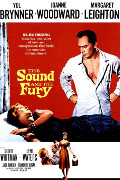
Directed by
Martin Ritt
115 minutes
Rated PG
Reviewed by
Bernard Hemingway

The Sound And The Fury
The casting of Yul Brynner who had won an Academy Award for his performance as the King of Siam in The King And I (1956) as a would-be Southern gentleman in this underwhelming adaptation of the 1929 novel of the same name by William Faulkner suggests a certain desperation (Laurence Olivier, Gregory Peck, Paul Newman and Kirk Douglas had been in the running at different times whilst Vivien Leigh, Audrey Hepburn and Lana Turner were considered for the Quentin role) but this is only the most obvious mis-calculation in a film that trots out the familiar tropes of the Southern Gothic genre - a once wealthy Southern family on its druthers, a bed-ridden matriarch, promiscuity, alcoholism, repressed sexuality, mental retardation (I assume the result of in-breeding) and so on - without raising a scintilla of the steam that is so essential to generate the requisite hot-house melodrama.
Only Joanne Woodward who had starred in Ritt’s previous and much more successful stab at another Faulkner novel with The Long Hot Summer, 1958, which gave Newman, Woodward’s husband-to-be, his first major screen role, strikes much in the way of a spark. But then again as Quentin is supposed to be an unruly seventeen and Woodward was nearly thirty, many scenes such as when Jason drops her off at school looks decidedly strange.
Brynner plays Jason, a proud man forced to work in a general store to support his useless family including his endlessly complaining mother, Quentin's uncle, and Jason’s mentally handicapped step-brother Benjy (Jack Warden who spends virtually the entire film staring silently into space and whom we could easily have done without just as we wouldn't have missed John Beal as Quentin’s alcoholic uncle). Then Quentin’s repentant good-time-girl) mother (Margaret Leighton apparently just come from a Tennessee Williams play) who abandoned her to Jason's care years prior turns up, although the script by Irving Ravetch and Harriet Frank Jr. makes surprisingly little of their relationship, Jason emerging as the sympathetic focal point through which the narrative passes.
The film’s title comes from Shakespeare’s 'Macbeth" in which life is described as "a tale told by an idiot, full of sound and fury, signifying nothing". Which re-contextualized stands as good a summary of Ritt’s film as you'll ever need.
Want something different?





